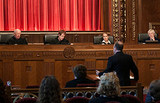Case Update

Three decisions from SCOTUS this past week, one involving Federal
pre-emption of state laws, another on patent
exhaustion, and a third on bankruptcy
defalcation. I'll wait right here
while you scramble off to read them. Or,
more likely, look up what "defalcation" means.
Back already?
Okay. The more interesting news,
in the now-you-tell-us category, was
former Justice Sandra Day O'Connor's rumination that perhaps the Supreme Court
shouldn't have taken Bush v. Gore. O'Connor's certainly not the first Supreme
Court justice to publicly lament earlier decisions. Lewis Powell cast the deciding vote in the
Court's 1986 decision in Bowers v.
Hardwick, which upheld Georgia's sodomy law; Powell retired a year later,
and told a reporter in 1990 that "when I had the opportunity to reread the
opinions a few months later, I thought the dissent had the better of the
arguments." And there's a fairly lengthy
list of justices who came to have second thoughts about their votes in death
penalty cases.
No second thoughts any of the justices down in Columbus, or at least none that they're sharing with us. The only criminal decision was State v. Athon, which we discussed on Friday. Some interesting cases in the court of appeals, though...
In
re M.K. presents the question of whether the concept of allied offenses
applies to juvenile court delinquency proceedings. There's a lot of case law which holds that it
doesn't, on the basis that juvenile proceedings are not really "criminal" in
nature, but are intended to help and rehabilitate the juvenile. M.K. argues that those cases were decided
back when that was actually true: with
mandatory bindovers, serious youth offender (SYO) sentences, and the ability of
the trial judge to convert an SYO sentence into an adult sentence, the system
is now more punitive, and should recognize allied offenses. The 6th District grudgingly rejects the
argument, but leaves for another day the question of whether allied offenses
analysis would apply if the judge did indeed impose an adult sentence.
One of the problems in plea withdrawal hearings is figuring
out precisely what the role of counsel is:
does the attorney argue in favor of allowing the client to withdraw the
plea that the attorney just worked out?
And what happens when the client claims that the attorney pressured him
into taking the deal, or didn't adequately explain it? The attorney can hardly be expected to take
his client's side and throw himself under the bus, but if he doesn't advocate
for the client, who does? The 9th
District takes a look at that in State
v. Oliver. When Oliver made the
claims about coercion and lack of explanation, the judge called his lawyer to
the stand and asked him questions about it, and the lawyer denied Oliver's
allegations. That obviously meant that
Oliver was no longer being "represented by counsel," and both parties spent a
large portion of their brief arguing about whether a motion to withdraw a plea
hearing was a "critical stage of the proceedings," at which Oliver was entitled
to counsel. (Like there should be any
question about that.) The court
sidesteps that question, deciding that Oliver was denied the assistance of
counsel because he wasn't given an opportunity to cross-examine his
lawyer.
In Parma
v. Benedict, the 8th District rejects the defendant's argument that his
attorney was ineffective for failing to tell him that a guilty plea to a DUI
would result in the automatic suspension of his commercial driver's
license. That brings up the issue of the
lawyer's duty to advise his client of the collateral consequences of a
conviction. The Supreme Court addressed
that in Padilla v. Kentucky, holding
that advice about the possible immigration consequences was required, but the Benedict court applies that decision
very narrowly, limiting it to immigration.
Whether that's the correct interpretation is another matter; the panel's
claim that a CDL suspension "is a civil, collateral consequence that is of
the type courts have excluded as the basis of ineffective assistance
claims" is supported only by a reference to Alito's concurring opinion in Padilla.
Part of the problem might be inadequate development of the argument;
according to the opinion, the treatment of this in Benedict's brief consisted
of a single two-sentence paragraph, without any reference to Padilla.
Imagine if he'd been
from the IRS. Sometimes the Lexis
headnote says it all. That certainly
looked to be the case in the 3rd District's decision in State
v. Hadley:
The trial court did not err by
denying defendant's request to instruct the jury on the presumption of
self-defense (castle doctrine) under R.C. 2901.05(B)(1) because no rational
juror could have found that defendant's use of a baseball bat against the
victim, a census taker, was reasonably necessary or proportionate to the
apparent danger.
It turns out, though, that Hadley represents one of the most extensive analyses of the Castle
Doctrine, and especially the methods of rebutting the presumption of self-defense
that it creates. We'll talk about that
more on Thursday.
Comments